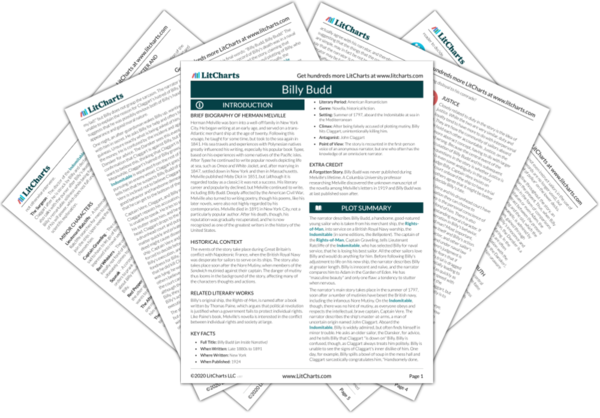Billy Budd begins with a lengthy description of the type of person known as the "handsome sailor" and the story's narrator often takes time away from the story to describe characters like Captain Vere or Claggart at length. As this suggests, the narrator of the story tends to see character as innate: people are either fundamentally good and innocent (like Billy Budd) or fundamentally sinister and bad, like Claggart. Thus, it is important for the narrator to describe characters fully before following them in the main story. Moreover, people's natural character in the story is closely connected to their physical appearance. "Handsome sailors" are admired both for their good looks and for their virtue. Billy Budd's handsome appearance signals to other sailors his good moral nature. The crew of the Indomitable (and Captain Vere) find it hard to believe that Billy would ever plan a mutiny largely because of his beauty, which they associate with innocence and upstanding morality. And when the narrator describes Claggart, the character's physical features are specifically related to aspects of his personality. The narrator says that Claggart's brow was the sort "associated with more than average intellect." But despite the narrator's concern for getting to the bottom of character's inner natures, some aspects of characters remain unknown. We never know Billy Budd's origins for certain, for example, while Claggart's motivations remain fundamentally a mystery.
The story also offers examples of when behavior does not match one's character, and when physical appearance contrasts with inner nature. Billy Budd's sudden outburst when he strikes Claggart seems very out of line with his gentle demeanor. And his inability to respond to Claggart's accusations when Captain Vere questions him might seem to suggest guilt, but in Billy's case it is simply a product of nervousness. (Fortunately for Billy, Captain Vere recognizes his stuttering as such, and does not interpret it as an outward sign of guilt.) And Claggart deliberately dissembles his appearance to Captain Vere when he accuses Billy of mutiny. He attempts to appear to the captain as a concerned, dutiful member of the ship, while also claiming that Billy's good behavior hides his true, disloyal nature. But it is Claggart, not Billy, whose outward appearance and behavior does not match his true character.
Thus, even while narrator insists on a close relationship between physical appearance and the innate moral qualities of a person, the story's events leave one wondering whether physical appearance is really a good indicator of someone's character. And in creating this question Billy Budd reveals a deeper level of exploration of the nature of appearances: the reliability of the narrator. While the narrator continues to espouse the belief in the connection between nature and appearance, the story continually calls such connections into question, suggesting that perhaps Melville as author does not actually agree with his narrator, and therefore further suggesting that the things that the narrator asserts are true, or are simple, may in fact be not true, or not simple. This is not to say that the narrator is purposefully lying, but rather that the narrator may be fallible and that his interpretation of the story may be affected by his blindnesses, including his faith in the connection between nature and appearance.
Natural Character and Appearance ThemeTracker

Natural Character and Appearance Quotes in Billy Budd
The moral nature was seldom out of keeping with the physical make. Indeed, except as toned by the former, the comeliness and power, always attractive in masculine conjunction, hardly could have drawn the sort of honest homage the Handsome Sailor in some examples received from his less gifted associates.
Billy in many respects was little more than a sort of upright barbarian, much such perhaps as Adam presumably might have been ere the urbane Serpent wriggled himself into his company.
His brow was of the sort phrenologically associated with more than average intellect; silken jet curls partly clustering over it, making a foil to the pallor below, a pallor tinged with a faint shade of amber akin to the hue of time-tinted marbles of old. This complexion, singularly contrasting with the red or deeply bronzed visages of the sailors, and in part the result of his official seclusion from the sunlight, though it was not exactly displeasing, nevertheless seemed to hint of something defective or abnormal in the constitution and blood.
Handsomely done, my lad! And handsome is as handsome did it too!
Now something such an one was Claggart, in whom was the mania of an evil nature, not engendered by vicious training or corrupting books or licentious living but born with him and innate, in short "a depravity according to nature."
The same, your honor; but, for all his youth and good looks, a deep one. Not for nothing does he insinuate himself into the good will of his shipmates, since at the least all hands will at a pinch say a good word for him at all hazards. ...It is even masked by that sort of good-humored air that at heart he resents his impressment. You have but noted his fair cheek. A man trap may be under his ruddy-tipped daisies.
Struck dead by an angel of God! Yet the angel must hang!
But in natural justice is nothing but the prisoner's overt act to be considered? How can we adjudge to summary and shameful death a fellow creature innocent before God, and whom we feel to be so?
Not that like children Billy was incapable of conceiving what death really is. No; but he was wholly without irrational fear of it, a fear more prevalent in highly civilized communities than those so-called barbarous ones which in all respects stand nearer to unadulterated Nature.
















